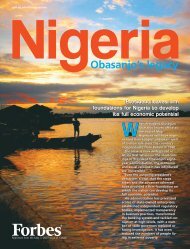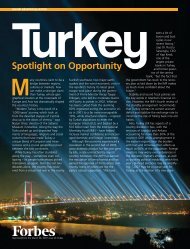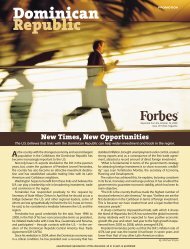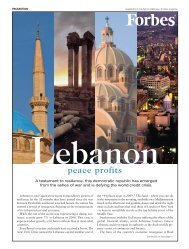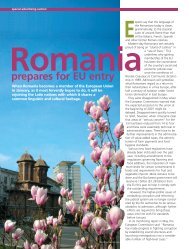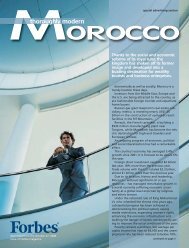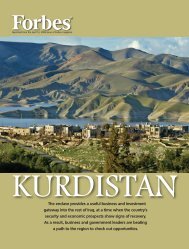Alberta
Alberta - Insight Publications
Alberta - Insight Publications
- No tags were found...
You also want an ePaper? Increase the reach of your titles
YUMPU automatically turns print PDFs into web optimized ePapers that Google loves.
special advertising section3Capital of cultureand business acumenThe impact of <strong>Alberta</strong>’s oil and gasindustry is rapidly changing thelandscape of Edmonton, its capital.Its business district is bustling with constructioncranes, and new town houseskeep popping up along the NorthSaskatchewan River. At least $87 billionin capital investments are on their way to<strong>Alberta</strong> in the next decade, andEdmonton is gearing up to absorb thebiggest chunk.While Edmonton’s economic growth isthe highest in Canadian history, manypeople are asking if the current boom issustainable. Within a generation theprovince’s conventional oil reserves willprobably run out and, while the oil sandsdeposits will last much longer, only continuedhigh prices will make these worthexploiting. So is there a plan B?“Clearly we have to work at diversifyingthe city’s economy, notwithstandingthe fact that energy is going to be amain factor for a long period of time,”says Allan E. Scott, president and chiefexecutive of the Edmonton EconomicDevelopment Corporation (EEDC), anonprofit organization wholly owned bythe city of Edmonton.The main objectives of the EEDC are topromote next-growth industries such asBattling to be competitiveRepercussions from a governmentdecision in 2006 to tax income trustsare aggravating the sector, which hadmushroomed to a market value of morethan $183 billion.Many of the trusts are resource-based,particularly those in oil and gas, such asProvident Energy Trust, which has itsheadquarters in Calgary. Provident wasformed by a conversion in 2001 fromFounders Energy Ltd. and has grown to$872 million in value.Last year’s announcement by federalFinance Minister Jim Flaherty haschanged the landscape for all trusts byincreasing the cost of capital, leavingthem at a disadvantage relative to themaster limited partnership (MLP), a trustlikestructure in the U.S.“What the government fails to realizeis that if we fail to dilute this U.S. cost ofcapital advantage, particularly in strategicassets like some of our midstreamassets, they are going to fall into foreigntourism, or knowledge-based sectors likehealth care and education, taking advantageof the fact that the city has an idealcorporate tax structure and is among thelowest-cost centers in the country fordoing business. “Although the economyhas heated up lately, setting up an officehere is still much cheaper than in anyother major city in Canada,” says Scott.Business clusters in the GreaterEdmonton area have also been successfullyimplemented, especially in the fieldsof food processing, life sciences, forestryand nanotechnology, all of which requirespecialized manufacturing.Last, but certainly not least,Edmonton’s cultural industry deserves tobe showcased. The city currently holdsmore than 30 festivals annually, focusingon music, theater, dance, food and popularculture. As recognition, Edmontonhas been selected as the 2007 CulturalCapital of Canada.“I always felt that one way to attractpeople to Edmonton was through artsand culture,” says Stephen Mandel,mayor of Edmonton. “ManyEdmontonians are concerned that we arenot as well known as other Canadiancities such as Calgary, but we have to goabout building our business and ourstrength as we move forward, as well aspromoting ourselves in an effectiveway.” ❖ Marco Vendittihands,” says Provident President andChief Executive Thomas Buchanan. “Thetax of the energy trusts in particulardoes not make a lot of sense.”Under an income trust structure, trustspay little tax, with the bulk of earningsdistributed to trust unit owners, who thenpay tax on the distributions as income.Flaherty argued that the structure wascosting the Canadian treasury $436 milliona year in lost taxes. Opponents ofthe move — including the Calgary-basedCanadian Coalition of Energy Trusts,which sprung up to oppose the policy —have lobbied hard to change the government’smind, but to no avail.Buchanan says that Provident, whichowns an MLP in the U.S., has more flexibilitythan most trusts and is consideringits options.“Having three business units puts us inan enviable position because we have alot more flexibility than a pure upstreamor pure midstream trust might have,”says Buchanan. ❖ Geoffrey Scotton, seniorbusiness writer with the Calgary Herald



